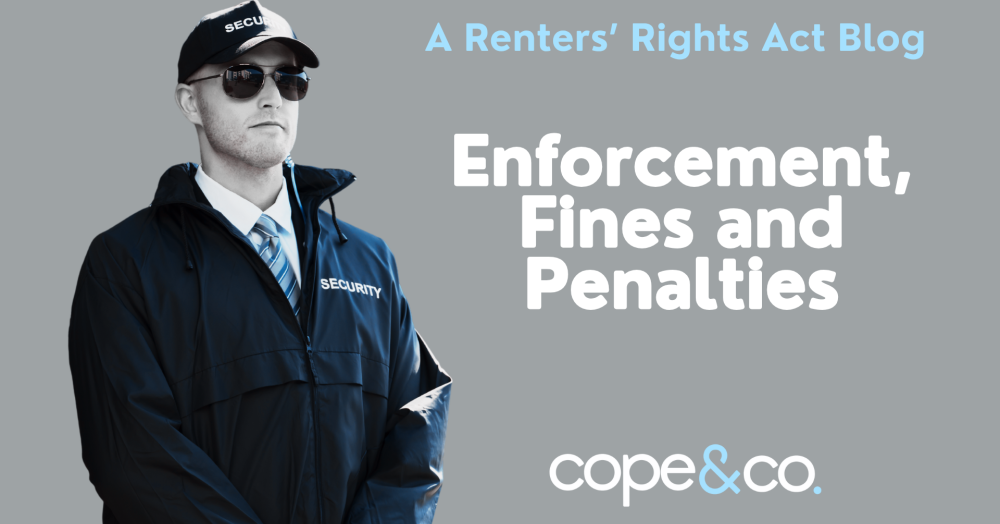
Penalties and Enforcement: What Landlords Need to Know
The Renters’ Rights Act brings substantial beefing-up of enforcement powers for authorities and stricter penalties for landlords who don’t comply. Rent Repayment Orders will be more powerful, civil penalties larger, and accountability broader. If you’re a landlord, these changes raise the stakes significantly and you need to know the details...
🔵 The Current Enforcement Landscape
At present, enforcement is inconsistent. Local councils can fine or prosecute landlords under housing laws, but resources vary. Tenants can apply for Rent Repayment Orders, but only for limited offences and up to 12 months’ rent. Many landlords have gambled on low odds of being caught.

🔵 What’s Changing Under the new Act?
The Renters' Rights Act significantly raises the stakes:
Rent Repayment Orders (RRO) doubled
A Rent Repayment Order can now cover up to two years' rent, increased from 12 months. To put that into context - if the monthly rent is £900.00, if the authorities believe that an offence is worthy, the penalty would be £21,600. Both tenants and councils can apply, and claims can be made up to two years after the offence.
Much wider liability
RRO's may apply not just to the immediate landlord but also to superior landlords, company directors, or others in the letting chain.
Civil penalties increased
Councils can issue civil fines of up to £7,000 for first or less serious breaches, and up to £40,000 for serious or repeat offences.
These apply to many aspects of non-compliance with the Act. Be aware, civil penalties allow authorities to penalise an offender financially, instead of pursuing a court case. Think parking fines.
Illegal eviction penalties strengthened
Councils will be able to issue penalties for unlawful eviction without needing to prosecute through the courts.
More local authority powers
Councils gain new investigatory powers - including requiring documents and entering properties - and can share data via the new 'Private Rental Sector Database'.
Banning orders remain in force
Persistent offenders can still face banning orders, stopping them from letting or managing property altogether.

🔵 What This Means for Landlords
These changes will have practical consequences:
Much higher risks - A single RRO could wipe out two years of rental income. Add fines of £40,000 and the financial hit could be devastating.
No hiding behind the chain - Even superior landlords and company directors could be held liable. If you’re linked to the property, you’re on the hook.
Stronger tenant incentives - With more power and longer claim windows, tenants will be more willing to pursue complaints.
Active councils - Local authorities will have both the tools and motivation to step up enforcement. Expect more inspections and investigations.
Reputational impact - Being fined, banned, or listed on the property portal could damage your standing as a landlord as much as your finances.

🔵 How Landlords Can Prepare
To protect your portfolio, take these steps now:
Audit your properties - Check all licences, safety certificates, and compliance paperwork are in place. Don’t assume you won’t be inspected in the future.
Join required schemes - Ensure you get registered with the Ombudsman and the PRS Database once they launch. Non-membership could itself trigger fines.
Strengthen record-keeping - Document everything: repairs, tenant communications, inspections, and compliance checks. Evidence is your defence.
Update tenancy agreements - Align agreements with the new rules, especially around possession, rent increases, and tenant rights (see individual blogs at the end of the article).
Resolve issues quickly - Many disputes escalate because landlords delay. Proactive communication and prompt repairs can prevent cases reaching the Ombudsman or tribunal.
Budget for compliance - Build in costs for licences, inspections, and professional advice. Prevention is far cheaper than a £40,000 fine or two years of lost rent.
Seek expert support - If you’re unsure about complex areas (HMOs, rent-to-rent, superior landlord liability), get legal or professional advice.

🔵 Final Word
The Renters’ Rights Act significantly increases the consequences for not complying. Rent Repayment Orders will cover more offences, can stretch over longer periods (up to two years), and extend to more people in the letting chain. Civil penalties rising to £7,000 for initial breaches and up to £40,000 for persistent or serious failures mean the risks are substantial.
If you get ahead of the changes now through audit, strong documentation, updated processes, and legal compliance, you can protect your properties, your income, and your reputation.
At Cope & Co., we’re here to make sure compliance never feels like a burden. From keeping your paperwork watertight to navigating the Renters’ Rights Act with confidence, our team can help you stay ahead and protect your income. Get in touch today to see how we can support you.

LetSimple is our unique, stress-free way to let us take care of everything. One monthly subscription, no hidden fees, and rent guarantee built in, so you can relax knowing your income is protected.
Click the image below to see how LetSimple gives landlords comfort, compliance, and complete peace of mind.











